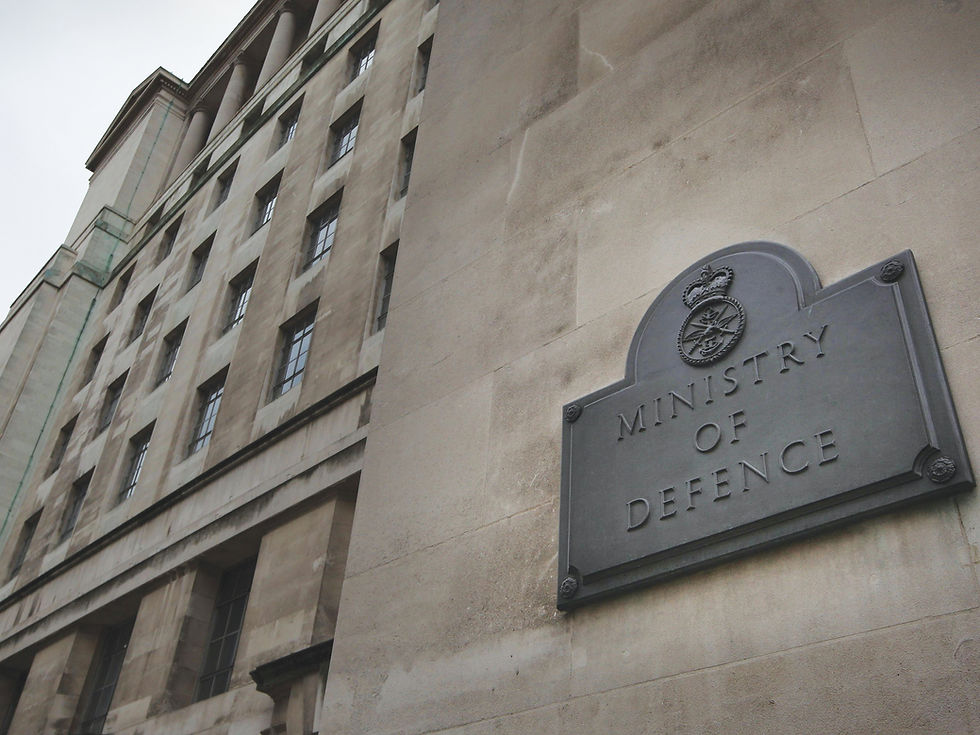Armed Forces Compensation Scheme unfit for purpose says Hilary Meredith-Beckham
- Admin

- Aug 29, 2023
- 3 min read
Updated: Sep 6, 2023
A report in The Sun today details how the Ministry of Defence paid out £107.2 million in compensation for accidents in the last year.

The MoD paid out £83.6million to service personnel and £23.6million to civilian staff.
The details were revealed by “safety officers who record all serious incidents for the Health and Safety Executive”.
Commenting on the findings, Hilary Meredith-Beckham, chair of Hilary Meredith Solicitors and Visiting Professor of Law and Veterans’ Affairs at the University of Chester said:
“I would welcome a discussion with the MoD on soldiers’ legal rights.
“It has been abundantly clear for a number of years that the MoD’s Armed Forces Compensation Scheme (AFCS) is unfit for purpose and desperately in need of reform.
“The AFCS is ‘no-fault’, meaning that if there is payment the MoD does not accept any fault for the injuries or illnesses claimed for by service personnel. Ever since the scheme was introduced in 2005, there has been lack of public accountability.”
Added Hilary: “It is now 36 years since the law allowed members of the British armed forces and their families to claim through the courts if they were injured or killed in service.
“The 1947 Crown Proceedings Act originally prevented legal action from being brought against the Ministry of Defence (MoD) over injuries suffered by service personnel.
“This changed in 1987 with the repeal of S10 of Act, putting members of our armed forces working alongside civilians on a level legal playing field.
“In 1988, I successfully ran the first ever claim on behalf of a widow whose husband had died on manoeuvres in Canada (Green v MoD).
“For the first time, military families who had lost loved ones now realised they could seek answers, transparency and closure from the MoD.
“With the MoD now accountable - albeit to a limited degree - thousands of cases followed - often brought by widows wanting to know how their loved ones had died.
“Many of the cases against the MoD have involved the lack of equipment. Our troops are the best in the world but, over the years, procurement of equipment has been mismanaged at best.
“A simple case in point was a fatal incident I investigated into the death of a guardsman on duty.
“I discovered the guardroom in which he was stationed in Germany was so cold at night that a small gas heater had to be used. The military, being so short of rubber tubing to mend engines or equipment, had made use of the rubber tube from the gas bottle to the heater, cutting it shorter and shorter. On the night of the accident, the guard lit the heater and the pipe was so close to the gas bottle it exploded, fatally injuring him.”
Continued Hilary: “What’s remained consistent over the last 36 years, is the MoD’s resistance to accountability.
“Crown immunity is a good place to start.
“Currently, the MoD cannot face prosecution in the same way as non-government bodies and a Crown Censure is the maximum sanction the HSE can bring.
“The Beyond Endurance Inquiry, which was set up after the deaths of three army reservists during a training exercise on Brecon Beacons in 2013.
“Failings on the exercise were described as ‘some of the most significant’ a health and safety inspector had seen.
“The Inquiry recommended that the MoD should be stripped of its historic immunity from prosecution when personnel are killed during training as a result of a serious failing in its duty of care. In its response, the MoD brazenly rejected this proposal.
“Removing crown immunity would push the MoD to improve its standards and ultimately save lives. And yet the MoD refuses to act.”
Added Hilary: “Combat immunity is another area in which the MoD has attempted to defy the courts. Combat immunity prevents the MoD from being sued when a soldier makes a mistake.
“While combat immunity is there to protect military operations when thinking is impaired in the heat of battle, it does not, as the MoD has tried to argue, apply to procurement decisions made back at Whitehall when equipment that is procured for our troops turns out to be faulty or unsuitable.
“The MoD has also tried, unsuccessfully to date, to channel complaints from service personnel, veterans and their families in to an internal compensation scheme, effectively extending combat immunity and preventing military claims from going to court at all.
“In a further erosion of soldiers’ legal rights, the government recently passed the Overseas Operations Act, which imposes a six-year long stop on civil claims and significantly disadvantages those who have served abroad - particularly service personnel and veterans who go on to suffer PTSD, which is often not diagnosed until several years after the event.”
Concluded Hilary: “While service personnel, veterans and their families are in a far stronger legal position than they were back in 1987, progress has stalled in recent years and the MoD’s lack of accountability betrays them all.”







